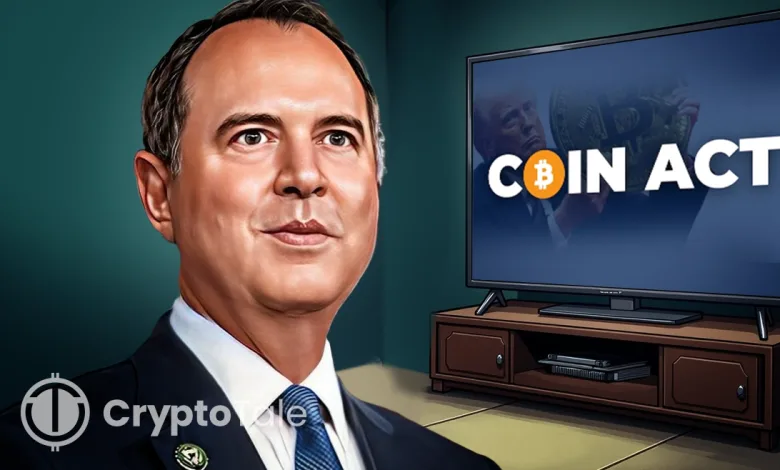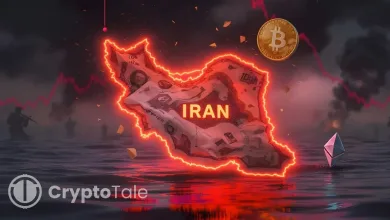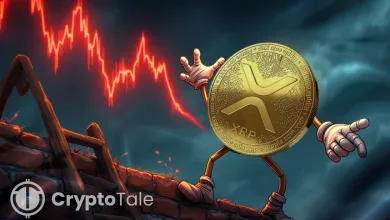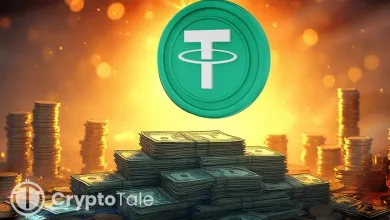COIN Act Seeks to Ban Public Officials From Crypto Investments

- Schiff’s bill blocks public officials from profiting through digital assets in office.
- Trump has earned an estimated $57 million from crypto businesses tied to his family.
- U.S. Democratic lawmakers continue to scrutinize private crypto ventures by Trump.
Ten Democratic lawmakers, led by Senator Adam Schiff, introduced the COIN Act on Monday to curb digital asset exploitation. The bill targets financial gains made by public officials through crypto ventures. It follows recent reports of President Donald Trump’s growing involvement and earnings in the crypto industry.
The proposed Curbing Officials’ Income and Nondisclosure (COIN) Act directly responds to Trump’s reported $57.4 million income from World Liberty Financial (WLF). The business, launched by Trump and his family in November, focuses on issuing a stablecoin and related crypto services. Schiff cited ethical concerns around the president’s digital asset dealings and alleged misuse of his office for personal financial gain.
Schiff stated, “President Donald Trump’s cryptocurrency dealings have raised significant ethical, legal, and constitutional concerns over his use of the office of the presidency to enrich himself and his family.” The bill also extends its restrictions to immediate family members of public officials.
What Does the COIN Act Propose?
The COIN Act emphasizes a ban on public officials who issue, promote, or sponsor digital assets. This restriction applies to NFTs, meme coins, stablecoins, and similar digital assets. The prohibition is expected to begin 180 days before taking office, and it should extend up to two years after leaving office.
Further, the COIN Act expands the Ethics in Government Act, which covers digital asset disclosure. It further categorizes crypto holdings as a form of financial interest, which is why they are subject to the rules of financial transparency, which are compulsory.
According to its supporters, the bill would establish a more stringent code of ethics for public officials. The aim is to seal possible loopholes in the financial reporting of crypto assets and profits. With the help of such provisions, it aims to prevent roundabout monetary enrichment in the case of family members.
Trump’s Expanding Crypto Portfolio Draws Scrutiny
Reports indicate that Donald Trump and his sons founded WLF last November. Since then, the company has issued a stablecoin and earned millions in crypto-related revenue. A financial disclosure shows Trump received $57.4 million from the enterprise.
Recently, Trump hosted a private dinner for $TRUMP meme coin investors. These moves have drawn criticism from lawmakers concerned about conflicts of interest and the lack of oversight.
According to Trump Media & Technology Group, the parent of Truth Social, the group has raised $2.5 billion for a bitcoin reserve. The company is developing several cryptocurrency financial products, adding to the scope of Trump’s involvement.
Related: Trump Supports Ban on Congressional Stock Trading Amid Concerns
COIN Act Faces Questions Over Timing and Consistency
Critics noted Schiff had voted in favor of the GENIUS Act, a stablecoin bill that exempts the president and vice president from similar restrictions. Although the GENIUS Act prohibits members of Congress and executive officials from issuing stablecoins, it exempts top leadership. This perceived inconsistency has sparked debate on social media.
“I can’t get over how cynical this is,” Slate’s Nitish Pahwa wrote on Bluesky. He added, “Dude just voted for a bill that was pushed by the crypto lobby and left out any protections against Trump’s corruption. Now he’s claiming to address the issue with a bill that will never pass?”
Previously, Representative Maxine Waters accused Trump of using the $TRUMP memecoin to enrich himself and possibly enable foreign influence. She also condemned a private gala for $TRUMP holders, calling it a “pay-to-play scheme.” Could the COIN Act become a foundation for holding public officials accountable in the evolving digital asset space?




